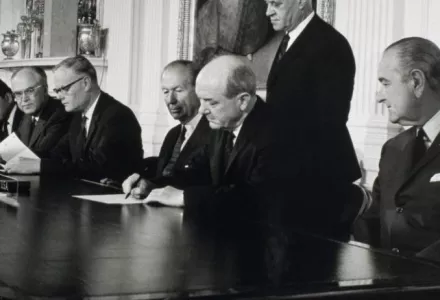The Hegemon's Toolkit: U.S. Hegemony and the Politics of the Nuclear Nonproliferation Regime
Speaker: Rebecca Davis Gibbons, Postdoctoral Research Fellow, Project on Managing the Atom/International Security Program
The Treaty on the Nonproliferation of Nuclear Weapons (NPT) is widely credited with contributing to international security through its promotion of nuclear restraint. Whereas almost all states in the international system are members of the NPT, many of these states have not signed on to additional treaties and agreements designed to strengthen the regime. Having already committed to foreswear the possession of nuclear weapons, why would some NPT members avoid taking steps to further the treaty's proclaimed goals? States' affinity to U.S. global leadership explains such variation.
Please join us! Coffee and tea provided. Everyone is welcome, but admittance will be on a first come–first served basis.




